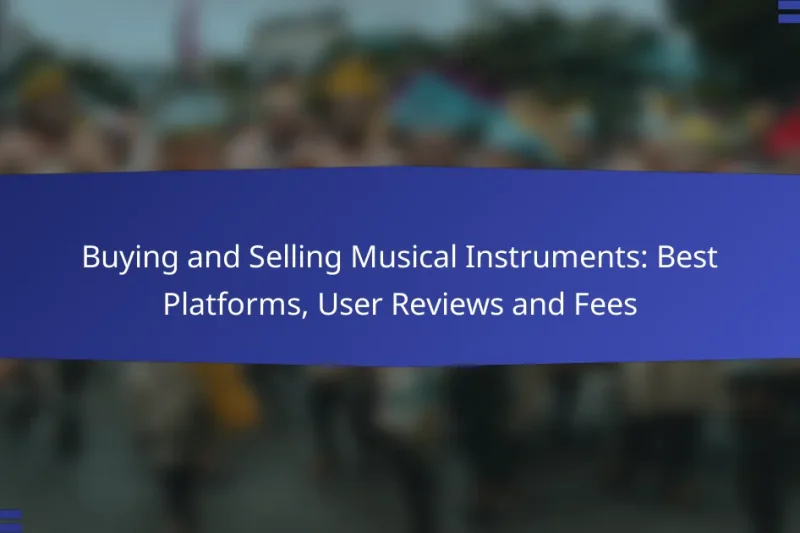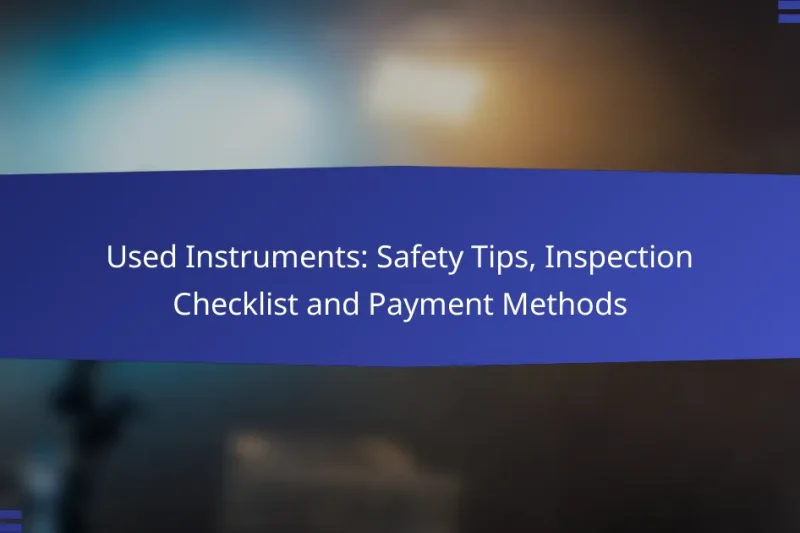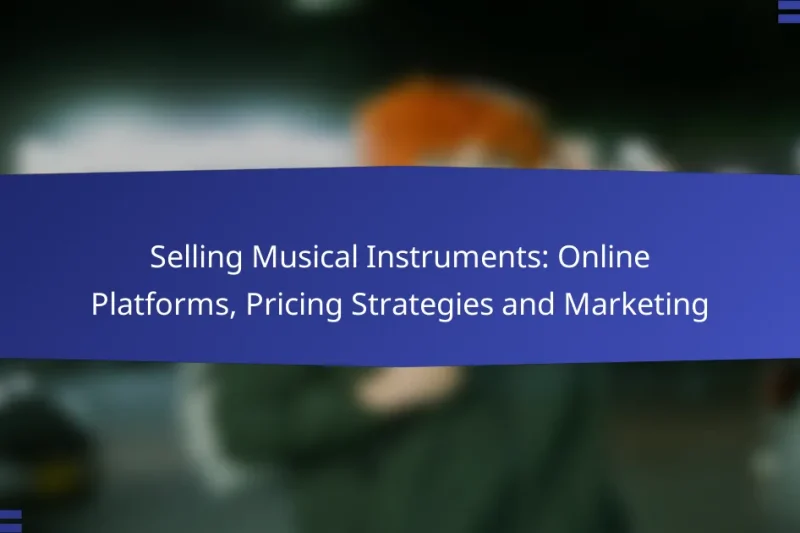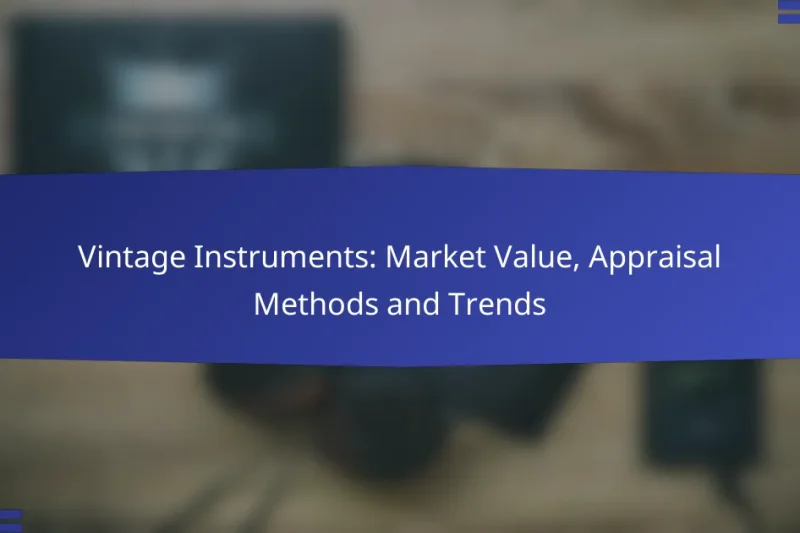Negotiating prices effectively requires a deep understanding of both your own needs and the seller’s position. … Negotiating Prices: Strategies, Tactics and Common PitfallsRead more
Buying and Selling Instruments
Buying and selling musical instruments can be a rewarding experience, whether you’re a beginner looking to start your musical journey or an experienced player seeking to upgrade. When purchasing, it’s essential to choose a reputable platform and consider factors like quality and seller reputation. For those selling, accurately assessing your instrument’s condition and understanding market demand will help you achieve a successful sale.
Musical Instruments: Return Policies, Warranty Information and Customer Rights
When buying musical instruments, it’s crucial to understand the return policies, warranty information, and customer rights … Musical Instruments: Return Policies, Warranty Information and Customer RightsRead more
Local Music Stores vs Online Retailers: Pros, Cons and Customer Experience
In the debate between local music stores and online retailers, each option presents distinct advantages and … Local Music Stores vs Online Retailers: Pros, Cons and Customer ExperienceRead more
Buying and Selling Musical Instruments: Best Platforms, User Reviews and Fees
When it comes to buying and selling musical instruments, selecting the right platform is essential for … Buying and Selling Musical Instruments: Best Platforms, User Reviews and FeesRead more
Used Instruments: Safety Tips, Inspection Checklist and Payment Methods
Buying used instruments can be a rewarding experience, but it’s essential to prioritize safety and make … Used Instruments: Safety Tips, Inspection Checklist and Payment MethodsRead more
Selling Musical Instruments: Online Platforms, Pricing Strategies and Marketing
Selling musical instruments online requires a strategic approach that encompasses selecting the right platform, implementing effective … Selling Musical Instruments: Online Platforms, Pricing Strategies and MarketingRead more
Vintage Instruments: Market Value, Appraisal Methods and Trends
Vintage instruments have become increasingly sought after, with their market value influenced by factors such as … Vintage Instruments: Market Value, Appraisal Methods and TrendsRead more
How to buy musical instruments online
Buying musical instruments online involves selecting a reputable platform, researching products, and ensuring secure payment methods. Focus on quality, price, and seller reputation to make informed decisions.
Top e-commerce platforms for instruments
Some of the leading e-commerce platforms for purchasing musical instruments include Amazon, eBay, Sweetwater, and Guitar Center. These sites offer a wide range of products, from beginner instruments to professional gear.
When choosing a platform, consider factors like customer reviews, return policies, and shipping options. Specialized retailers often provide better expertise and customer service compared to general marketplaces.
Best practices for online purchases
Before making a purchase, read product descriptions carefully and check for specifications that match your needs. Look for user reviews to gauge the quality and performance of the instrument.
Always verify the seller’s reputation and return policy. If possible, buy from sellers who offer a money-back guarantee or a trial period to ensure satisfaction with your purchase.
Shipping options for musical instruments
Shipping options for musical instruments vary by retailer but generally include standard, expedited, and sometimes overnight delivery. Consider the shipping costs and delivery times when making your decision.
Ensure that the instrument is well-packaged to prevent damage during transit. Some retailers offer insurance for valuable items, which can provide added peace of mind during shipping.
What are the best musical instruments for beginners?
The best musical instruments for beginners are typically those that are easy to learn and play, offering a good balance between affordability and quality. Instruments like guitars and pianos are popular choices due to their versatility and the availability of learning resources.
Guitar models for beginners
For beginners, acoustic guitars are often recommended due to their simplicity and lower cost. Models such as the Yamaha FG800 or the Fender CD-60S provide good sound quality and playability without breaking the bank, usually priced between $200 and $400.
Electric guitars can also be a great option, especially for those interested in rock or pop music. The Squier Stratocaster or the Epiphone Les Paul Standard are affordable choices, typically ranging from $200 to $500, and they come with a variety of features suitable for new players.
Piano options for new learners
Digital pianos are ideal for beginners, offering a range of features that can aid in learning. Models like the Yamaha P-45 or the Casio Privia PX-160 are popular, priced around $400 to $600, and provide weighted keys that simulate an acoustic piano feel.
For those on a tighter budget, keyboard instruments can be a practical alternative. The Casio CT-S300 or the Yamaha PSS-F30 are portable, user-friendly, and generally cost between $100 and $300, making them accessible for new learners.
How to sell used musical instruments
Selling used musical instruments involves assessing their condition, determining a fair price, and choosing the right platform for sale. Understanding the market demand and being transparent about the instrument’s history can enhance your chances of a successful sale.
Popular marketplaces for selling instruments
Several online platforms cater specifically to selling musical instruments. Websites like Reverb, eBay, and Craigslist allow sellers to reach a wide audience. Local music shops may also offer consignment options, providing a more personal touch.
Social media marketplaces, such as Facebook Marketplace, have gained popularity for selling instruments quickly within local communities. Each platform has its pros and cons, so consider factors like fees, audience reach, and ease of use when choosing where to list your instrument.
Tips for pricing used instruments
When pricing used instruments, research similar items to gauge the market value. Generally, instruments in good condition can be priced at 50-70% of their original retail price, depending on brand and demand. Be prepared to adjust your price based on the instrument’s condition and any included accessories.
Consider offering a slight discount for quick sales or bundling items together for a better deal. Transparency about any wear or repairs can justify your asking price and build trust with potential buyers.
What should you consider when buying a used instrument?
When buying a used instrument, it’s essential to evaluate its condition, brand reputation, and potential resale value. Understanding these factors can help ensure you make a wise investment that meets your musical needs.
Condition assessment criteria
Assessing the condition of a used instrument involves checking for physical damage, wear and tear, and functionality. Look for signs of rust, dents, or cracks, and ensure all parts are in working order.
For string instruments, inspect the neck and body for warping. For wind instruments, check for leaks or stuck valves. A thorough inspection can save you from costly repairs later.
Brand reputation and resale value
The brand of an instrument can significantly influence its quality and resale value. Well-known brands often have a track record of durability and performance, making them more desirable in the used market.
Research the brand’s reputation and consider how it holds its value over time. Instruments from reputable brands may retain their worth better, making them a safer investment for future resale.
How to evaluate instrument quality?
Evaluating instrument quality involves assessing various factors such as craftsmanship, materials, and sound performance. Understanding these elements can help buyers make informed decisions and ensure they invest in a quality instrument.
Key quality indicators for guitars
When evaluating guitars, consider the materials used in construction, including the type of wood for the body, neck, and fretboard. Solid wood generally offers better sound quality compared to laminate. Additionally, check the craftsmanship, such as the fit of the neck joint and the quality of the finish.
Sound quality is paramount; play the guitar to assess its tone, sustain, and resonance. Look for a balanced sound across all strings and a comfortable action that suits your playing style. A well-set-up guitar will be easier to play and more enjoyable.
Essential features of quality pianos
For pianos, key features include the type of action, the quality of the hammers, and the materials used in the soundboard. Grand pianos typically offer superior sound and touch compared to uprights, making them a preferred choice for serious musicians.
Check the tuning stability and the overall condition of the instrument. A well-maintained piano should hold its tuning for extended periods. Additionally, consider the touch response; a quality piano will provide a consistent feel across all keys, allowing for expressive playing.
What are the top brands for musical instruments?
The top brands for musical instruments are recognized for their quality, craftsmanship, and innovation. Popular choices include companies that specialize in guitars, pianos, and other instruments, each offering unique features and price ranges to suit different musicians’ needs.
Leading guitar brands
When it comes to guitars, brands like Fender, Gibson, and Ibanez are often at the forefront. Fender is known for its iconic Stratocaster and Telecaster models, while Gibson is famous for its Les Paul and SG guitars. Ibanez offers a wide range of electric and acoustic guitars that cater to various playing styles.
Consider factors such as playability, sound quality, and price when choosing a guitar brand. Entry-level guitars from brands like Yamaha or Squier can be great for beginners, while professional musicians may prefer high-end models from PRS or Music Man.
Renowned piano manufacturers
In the world of pianos, brands like Steinway & Sons, Yamaha, and Kawai are highly regarded. Steinway is often considered the gold standard for grand pianos, known for their rich tone and exceptional craftsmanship. Yamaha offers a range of pianos from affordable digital models to high-quality acoustic pianos.
When selecting a piano, think about the type of music you want to play and your budget. Digital pianos can be a cost-effective option for beginners, while acoustic pianos, such as those from Bösendorfer or Fazioli, are ideal for serious pianists seeking superior sound quality.
How to maintain your musical instrument?
Maintaining your musical instrument is essential for preserving its sound quality and longevity. Regular care and cleaning can prevent damage and ensure optimal performance.
Cleaning and care tips
To keep your instrument in top condition, establish a regular cleaning routine. For string instruments, wipe down the strings and body after each use to remove sweat and oils. Woodwind instruments require disassembly for thorough cleaning, while brass instruments benefit from regular polishing to prevent tarnishing.
Use appropriate cleaning materials specific to your instrument type. For example, microfiber cloths are ideal for polishing, while specialized brushes can help clean hard-to-reach areas. Avoid using harsh chemicals that could damage the finish or internal components.
Additionally, consider environmental factors that may affect your instrument. Store it in a climate-controlled environment to prevent warping or cracking, and use a case for protection during transport. Regularly check for signs of wear or damage, and address any issues promptly to avoid costly repairs.






